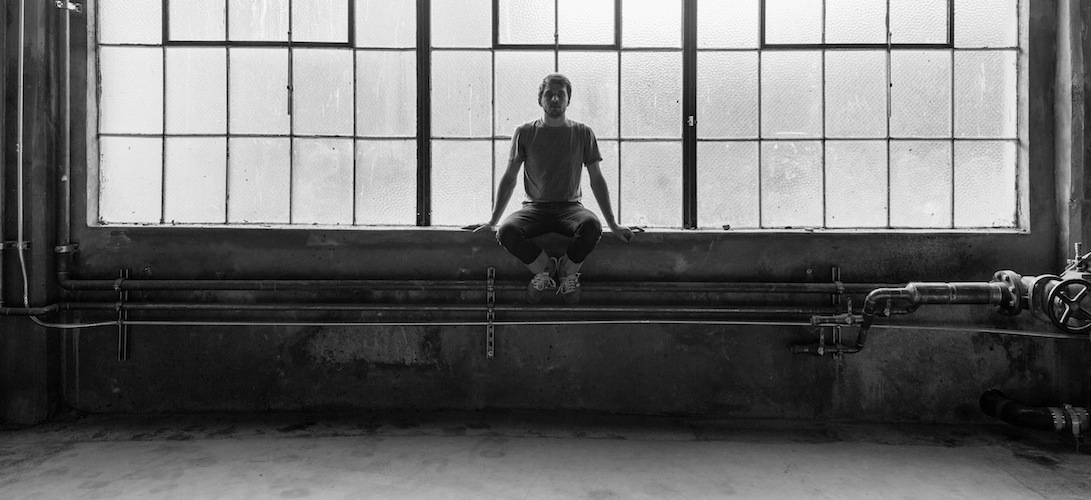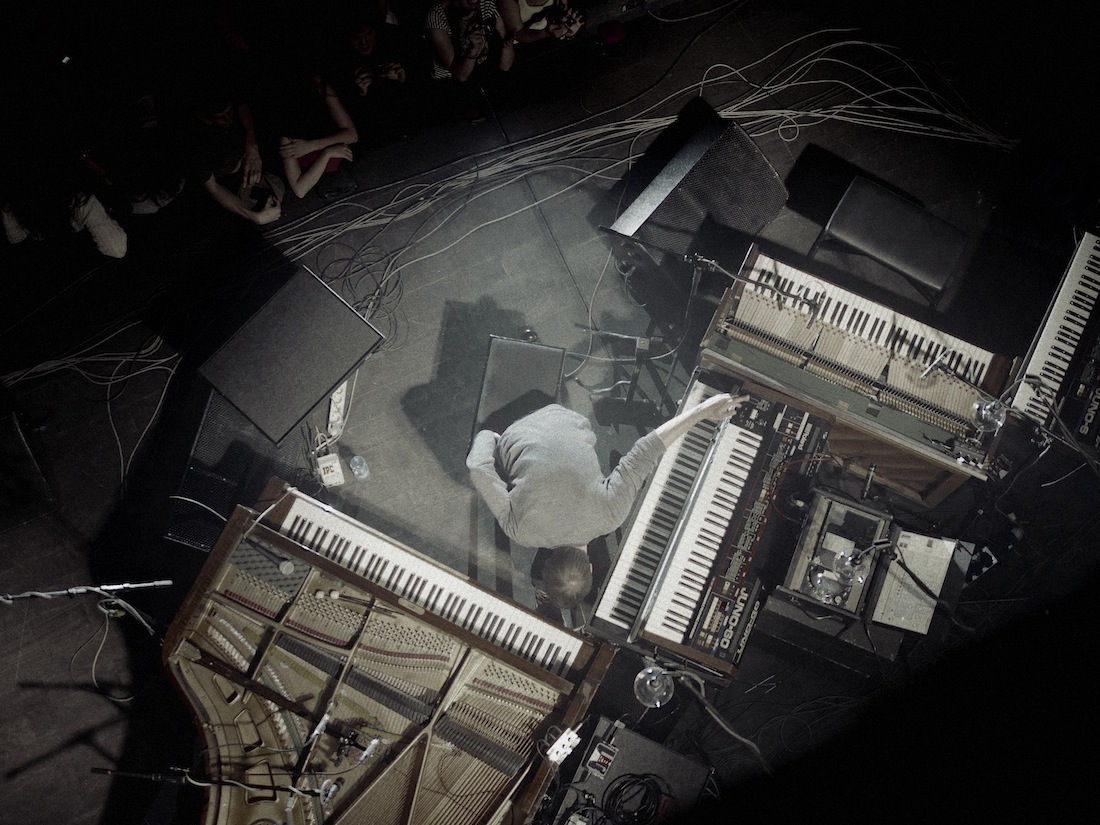Q&A: Nils Frahm
The acclaimed composer and performer preps the latest installement of the 'Late Night Tales' mix-CD series.

Q&A: Nils Frahm
The acclaimed composer and performer preps the latest installement of the 'Late Night Tales' mix-CD series.

As the phone clicks and a soft-spoken Nils Frahm gives a greeting, it’s hard to imagine how he even has time for an interview, let alone a new project. The solo musician and composer has been established in the experimental, modern-classical and ambient realms for some time now, but it was he Berlin-based artist’s Spaces LP in 2013 that brought him an even greater fanbase. Now, in the midst of an extensive touring period, he’s found time to deliver his edition of the Late Night Tales series, drawn from his extensive music collection which occupies his home in Berlin; in addition, his ongoing compositional and production partnership with friend and Erased Tapes labelmate Olafur Arnalds has yielded fresh material.
You’ve said that you own music in a wide variety of formats, spanning hand-cranked 78 phonograph players, to 45s, and cassettes, right through to all manner of digital files. Is the process of digesting all of these different sources with the aim of making a mix that flows well a difficult one?
Oh, the formats don’t really matter. I check all kinds of sources. I’m not really using Spotify or anything because I can’t remember what is out there unless I really have my own collection, so I have cassettes and MiniDiscs and vinyl records and CDs. It’s kind of funny because I’m not that old—I’m 32 now—and some of these formats are from my past. It seems like every year there is new music on new formats available to us which we are supposed to use.
Your relationship with the Erased Tapes label is well established How did it begin?
It was through Peter Broderick, who got in touch with [Erased Tapes label founder] Robert Raths, and he must have listened to my music through Peter. He got in touch and wanted to sign me…in 2009, I think? And in 2010 we began working together for the first time.
You are a frequent collaborator, and have new work out with with Ólafur Arnalds. How do your collaborations come about?
It’s always a little bit of chance, the relationship and, of course, musical abilities or similar taste. It’s kind of random. I don’t really make plans to reach out to people and write to them, then write again to see if they want to collaborate. Writing one week then again the next week, it’s just not how it works. We meet or we don’t meet. You have to make friends to some extent, and a lot of the times you suggest but may still never meet. And when if connect and propose collaboration, even then it doesn’t always happen often. If it happens five or six times then I probably attempted 30 times.

You performed in Berlin last fall alongside Jon Hopkins at Admiralspalast. What can you tell us about that particular collaboration?
Jon really wanted to have a seated show where he could also have a piano. I felt like he wanted to have a concert, but it was pretty banging. [laughs] I could see a couple of people leaving the hall, but most people really loved it. I like Jon; he’s a great performer and really good musician. How he uses he uses his equipment live has a lot in common with how I use my instruments—it’s a good match. We haven’t spent time in the studio yet, but we appreciate each others music. He suggested that I should make a remix for his Late Night Tales edition, and this is a good example of how people start to know each other. Perhaps begin on e-mail, have this remix, then meet at a concert or two, and then maybe make an album together—or not. I’m a solo musician, but I really like to be in a network or framework of people who can help each other out in general ways. Even when working alone, we still need people to talk to and share our thoughts with, so it is really important to have certain people who understand very detailed problems. This is why it’s good to collaborate—you stand to learn so much from it.
You’ve recently played at BBC Proms, Melt!, Admiralspalast, and Lovebox, among other events and venues. How do you fluidly move between performing on a variety stages with different audience expectations?
I make up my mind before I go, and on the way there, I have time to come up with a set list or a concept about what I want to say or what I want to do. I don’t really have time to practice before every single show; practice time is rare and I need a lot of space, so I really have to map out in my head what could work in that show. Sometimes you’re right; sometimes you’re wrong. And if a performance is not working, I can change it on the fly because I am alone. I don’t need to discuss with my band what to do next, I just do it—so nobody really finds out that I was changing my mind. There were many different shows this summer and it was almost a different set list every day, so it was quite fun.
You recently worked on the score for the film Victoria. What drew you to that project?
When you watch it, you know. Some films are powerful and strong, others are not—I like films when they mean something and Victoria was doing that. I don’t watch a lot of films, most films really bore me—and I switch them off after 30 minutes. But with Victoria, I felt “Oh I can make music for this—great, lets do it.”
Does all your recording take place at your home base, Durton Studio?
Pretty much. Everything certainly gets mixed down here, but not all the recording is especially made here. I don’t really like working on the road; I try to keep it for the studio. It’s just so much fun to work in a real studio.
What are you listening to right now?
The new Tame Impala was quite fun. Of course all the music from Late Night Tales. I’m listening to a lot of dub and dub techno these days, fantastic Rhythm & Sound record called See Mi Yah. As for new stuff, I listen to releases that my friends are doing. I don’t buy so much music, to be honest—I don’t have time to listen and I have so many records already. Oh, I should mention the Black September original music performed by Vercetti Technicolor, it’s inspired by the 1999 documentary by Kevin MacDonald. There is a PLAY TONTO remix…really cool record. I listen to tons of jazz, all the time. I’m getting old.
What are your future plans?
I’m taking a break—one more concert, then people will slowly realize that all the concerts from my home page are fading, and I’m really quite curious what I will do then. I’ve never had more than three months off touring since 2008; frankly, I’m not sure what will happen. I really want to make a new album, or record all these big pieces I am playing live already, but never really done anything with. Maybe make more new stuff…but also relax a little bit, and work on ideas for new instrument designs which I want to discuss with my little team of engineers and friends. And we’ll see if we can move forward with a different live show for the future.

